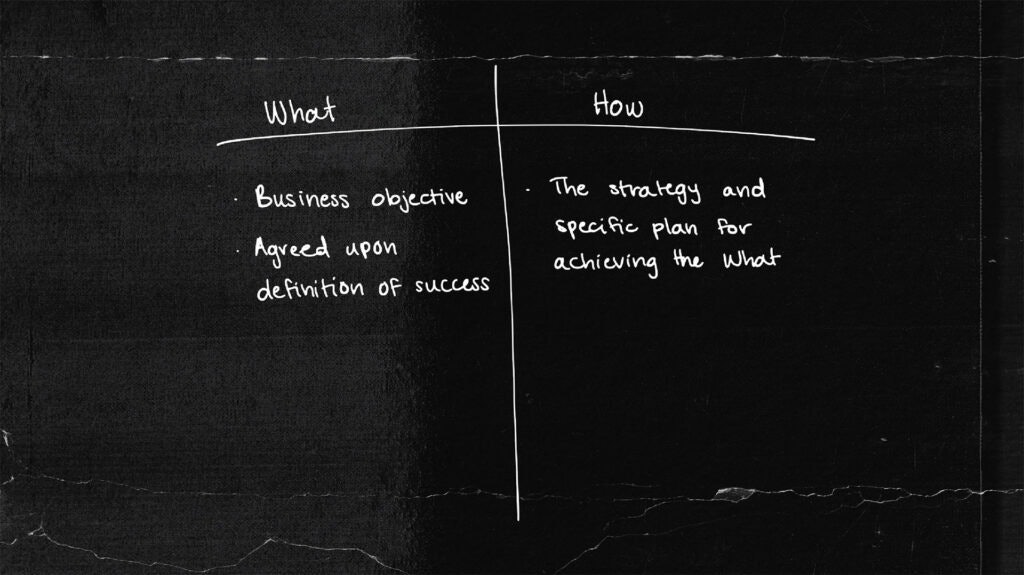Everyone nods their heads back and forth and gets excited about the opportunity to establish a beneficial relationship that lasts into the future. However, there’s often a disconnect between what an agency means when it comes to strategic partnering, and what a buyer is actually asking for. This challenge is compounded by the fact that all of us buy the way we sell. If your business sells through RFP submissions, has standardized pricing expectations, or competes in a world of highly comparable products, the understandable expectation is that the agency you are shopping for will do the same. This style of comparison shopping often works for execution vendors; it does not work for strategic partners.
The reality is there are times you want to buy a strategic partner, and there are times you will benefit from working with an execution partner. Let’s begin by defining both, and then move into how to determine which sort of outside firm will do best for your environment.
Defining strategic relationships and vendor relationships
For the purpose of this article, and in the way we define strategic versus vendor at Element Three, a strategic partner is one who is engaged first for thinking (example: go to market strategy, conducting internal and external research, brand strategy development), and then for doing (example: setting up ad platforms, creating assets for a campaign, developing thought leadership content). An execution vendor contrasts this structure of engagement by being first and foremost a capacity expander. This sort of firm is engaged to execute on your already defined strategy and is often hired to design ad images and write the copy for said ads, create sales collateral, and manage paid media campaigns among many other potential initiatives.
Strategic relationship = centered on the thinking capabilities of the outside firm
Vendor relationship = centered on the execution capabilities of the outside firm
How to determine if you need an execution vendor or a strategic partner
The first question to ask yourself in determining which relationship you are in need of is best illustrated by imagining a What vs How T Table. On one half of the table is the goal for the engagement – the what. You, as the hiring business, will know the answer to the What. It is possible that there needs to be refinement, but a partner cannot dictate your goals or define by themselves what defines good in the work. On the other half, you have the How. The How is the strategy, tactics, investment, and timeframe needed to achieve the What.

If you have confidence in your How and clarity in your What, you do not need a strategic partner. You need an execution vendor. The flip side is also true. As you move from clarity to questioning the What or the How, the need for a strategic partner grows. Of course, there are also partners who do both. Element Three is an example of one of these firms, maintaining in-house strategy development, executing on the highest priority work to bring the strategy to life, and supplementing with a trusted partner/freelance network.
How to shop for each type of firm
The buying strategy for both of these scenarios deserves additional attention. When you are in a position to buy an execution vendor, you possess the strategy and have many of the most important logistic questions (timeline, budget, deliverables expected) already sorted out. Therefore, you can dictate a fair amount of the buying process. You’ll likely want to see examples of the deliverable you’re asking for and to understand how the agreement will be structured, billed, and finally executed.
In contrast, when you are in need of the guidance of a strategic partner, that partner should be guiding the buying process. What you’re really searching for is how this partner thinks. Candidly, this is challenging. You’ll need access to people who lead the work and to pay close attention to the sort of questions they ask. You’ll also want to look for examples of experience guiding other businesses to the outcomes you are looking for. This is when shopping on examples and comparisons can get you in a tough spot. With so many bespoke solutions, the exact deliverables will often look different because the business needs vary greatly. Search for proof of knowledge through repeatable processes, understanding of the challenge you’re looking to solve, and the overall quality of the process you experience.
Understand your goals, and then follow the right process
There is a phrase that our CEO, Tiffany Sauder, is fond of saying: “Assume good intent.” When we work with our customers, it’s important that we are all racing toward the same goal. The same feeling needs to be present when shopping for an outside firm, regardless of which style you need. The goal is simple: make a good buying decision. However, many firms make this far more difficult than it needs to be, by not clearly articulating the environments in which they do their best work. There is shared responsibility and all parties should work to understand first the type of firm needed for the engagement, and then to discover if the business need and firm expertise match up well.





